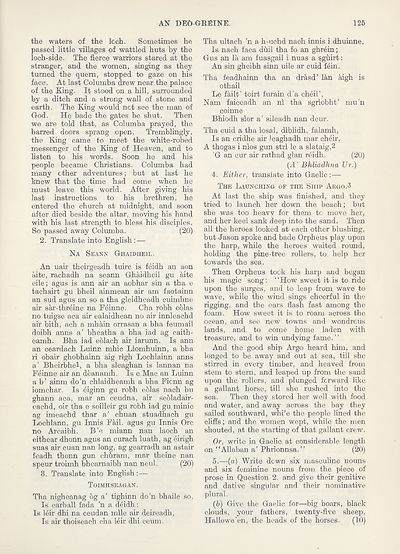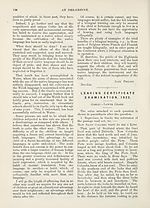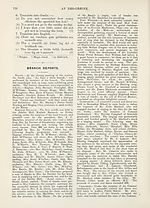An Comunn Gàidhealach Publications > Deo-gréine > Volume 17, October 1921 to September 1922
(133) Page 125
Download files
Complete book:
Individual page:
Thumbnail gallery: Grid view | List view

AN DEO GREINE.
125
the waters of the loch. Sometimes he
passed little villages of wattled huts by the
loch-side. The fierce warriors stared at the
stranger, and the women, singing as they
turned the quern, stopped to gaze on his
face. At last Columba drew near the palace
of the King. It stood on a hill, surrounded
by a ditch and a strong wall of stone and
earth. The King would net see the man of
God. He bade the gates be shut. Then
we are told that, as Columba prayed, the
barred doors sprang open. Tremblingly,
the King came to meet the white-robed
messenger of the King of Heaven, and to
listen to his words. Soon he and his
people became Christians. Columba had
many ether adventures; but at last he
knew that the time had come when he
must leave this world. After giving his
last instructions to his brethren, he
entered the church at midnight, and soon
after died beside the altar, moving his hand
with his last strength to bless his disciples.
So passed away Columba. (20)
2. Translate into English : —
Na Seann Ghaidheil.
An uair theirgeadh tuirc is feidh an aon
aite, rachadh na seann Ghaidheil gu aite
eile; agus is ann air an aobhar sin a tha e
tachairt gu bheil ainmean air am faotainn
an sud agus an so a tha gleidheadh cuimhne
air sar-threine na Feinne. Cha robh colas
no tuigse aca air ealaidhean no air innleachd
air bith, ach a mhain orrasan a bha feumail
doibh anns a’ bheatha a bha iad ag caith-
eamh. Bha iad eolach air iarunn. Is ann
an ceardach Luinn mhic Llomhuinn, a bha
ri obair ghobhainn aig rlgh Lochlainn anns
a’ Bheirbhel, a bha sleaghan is lannan na
Feinne air an deanamh. Is e Mac an Luinn
a b’ ainm do’n chlaidheamh a bha Ficnn ag
iomchar. Is eiginn gu robh eblas nach bu
ghann aca, mar an ceudna, air seoladair-
eachd, oir tha e soilleir gu robh iad gu minic
ag imeachd thar a’ chuan stuadhach gu
Lochlann, gu Innis F&il. agus gu Innis Ore
no Arcaibh. B’e miann nan laoch an
eithear dhonn agus an curach luath, ag eirigh
suas air cuan nan long, ag gearradh an astair
feadh thonn gun churam, mar theine nan
speur troimh bheamaibh nan neul. (20)
8. Translate into English: —
Toimhseagan.
Tha nigheanag 6g a’ tighinn do’n bhaile so,
Is earball fada 'n a d£idh :
Is l&r dhi na ceudan mile air deireadh,
Is air thoiseach cha Mir dhi ceum.
Tha ultach ’n a h-uchd nach innis i dhuinne,
Is nach faca diiil tha fo an ghr^in;
Gus an la am fuasgail i nuas a sgiiirt:
An sin gheibh sinn uile ar cuid Min.
Tha feadhainn tha an drasd’ Ikn aigh is
othail
Le failt’ toirt furain d’a cheil’,
Nam faiceadh an nl tha sgriobht’ mu’n
coinne
Bhiodh slor a’ sileadh nan deur.
Tha cuid a tha losal, dlblidh, falamh,
Is an cridhe air leaghadh mar ch&r,
A thogas i nlos gun strl le a slataig,2
’G an cur air rathad glan reidh. (20)
(A’ Bhliadhna Ur.)
4. Either, translate into Gaelic: —
The Launching of the Ship Argo.3
At last the ship was finished, and they
tried to launch her down the beach; but
she was too heavy for them to move her,
and her keel sank deep into the sand. Then
all the heroes looked at each other blushing,
but Jason spoke and bade Orpheus play upon
the harp, while the heroes waited round,
holding the pine-tree rollers, to help her
towards the sea.
Then Orpheus took his harp and began
his magic song: “How sweet it is to ride
upon the surges, and to leap from wave to
wave, while the wind sings cheerful in the
rigging, and the oars flash fast among the
foam. How sweet it is to roam across the
ocean, and see new towns and wondreus
lands, and to come home laden with
treasure, and to win undying fame.’’
And the good ship Argo heard him, and
longed to be away and out at sea, till she
stirred in every timber, and heaved from
stem to stern, and leaped up from the sand
upon the rollers, and plunged forward like
a gallant horse, till she rushed into the
sea. Then they stored her well with food
and water, and away across the bay they
sailed southward, whi1e the people lined the
cliffs; and the women wept, while the men
shouted, at the starting of that gallant crew.
Or, write in Gaelic at considerable length
on “Allaban a’Phrionnsa.’’ (20)
5. —(a) Write down six masculine nouns
and six feminine nouns from the piece of
prose in Question 2, and give their genitive
and dative singular and their nominative
plural.
(b) Give the Gaelic for—big boars, black
clouds, your fathers, twenty-five sheep,
Hallowe’en, the heads of the horses. (10)
125
the waters of the loch. Sometimes he
passed little villages of wattled huts by the
loch-side. The fierce warriors stared at the
stranger, and the women, singing as they
turned the quern, stopped to gaze on his
face. At last Columba drew near the palace
of the King. It stood on a hill, surrounded
by a ditch and a strong wall of stone and
earth. The King would net see the man of
God. He bade the gates be shut. Then
we are told that, as Columba prayed, the
barred doors sprang open. Tremblingly,
the King came to meet the white-robed
messenger of the King of Heaven, and to
listen to his words. Soon he and his
people became Christians. Columba had
many ether adventures; but at last he
knew that the time had come when he
must leave this world. After giving his
last instructions to his brethren, he
entered the church at midnight, and soon
after died beside the altar, moving his hand
with his last strength to bless his disciples.
So passed away Columba. (20)
2. Translate into English : —
Na Seann Ghaidheil.
An uair theirgeadh tuirc is feidh an aon
aite, rachadh na seann Ghaidheil gu aite
eile; agus is ann air an aobhar sin a tha e
tachairt gu bheil ainmean air am faotainn
an sud agus an so a tha gleidheadh cuimhne
air sar-threine na Feinne. Cha robh colas
no tuigse aca air ealaidhean no air innleachd
air bith, ach a mhain orrasan a bha feumail
doibh anns a’ bheatha a bha iad ag caith-
eamh. Bha iad eolach air iarunn. Is ann
an ceardach Luinn mhic Llomhuinn, a bha
ri obair ghobhainn aig rlgh Lochlainn anns
a’ Bheirbhel, a bha sleaghan is lannan na
Feinne air an deanamh. Is e Mac an Luinn
a b’ ainm do’n chlaidheamh a bha Ficnn ag
iomchar. Is eiginn gu robh eblas nach bu
ghann aca, mar an ceudna, air seoladair-
eachd, oir tha e soilleir gu robh iad gu minic
ag imeachd thar a’ chuan stuadhach gu
Lochlann, gu Innis F&il. agus gu Innis Ore
no Arcaibh. B’e miann nan laoch an
eithear dhonn agus an curach luath, ag eirigh
suas air cuan nan long, ag gearradh an astair
feadh thonn gun churam, mar theine nan
speur troimh bheamaibh nan neul. (20)
8. Translate into English: —
Toimhseagan.
Tha nigheanag 6g a’ tighinn do’n bhaile so,
Is earball fada 'n a d£idh :
Is l&r dhi na ceudan mile air deireadh,
Is air thoiseach cha Mir dhi ceum.
Tha ultach ’n a h-uchd nach innis i dhuinne,
Is nach faca diiil tha fo an ghr^in;
Gus an la am fuasgail i nuas a sgiiirt:
An sin gheibh sinn uile ar cuid Min.
Tha feadhainn tha an drasd’ Ikn aigh is
othail
Le failt’ toirt furain d’a cheil’,
Nam faiceadh an nl tha sgriobht’ mu’n
coinne
Bhiodh slor a’ sileadh nan deur.
Tha cuid a tha losal, dlblidh, falamh,
Is an cridhe air leaghadh mar ch&r,
A thogas i nlos gun strl le a slataig,2
’G an cur air rathad glan reidh. (20)
(A’ Bhliadhna Ur.)
4. Either, translate into Gaelic: —
The Launching of the Ship Argo.3
At last the ship was finished, and they
tried to launch her down the beach; but
she was too heavy for them to move her,
and her keel sank deep into the sand. Then
all the heroes looked at each other blushing,
but Jason spoke and bade Orpheus play upon
the harp, while the heroes waited round,
holding the pine-tree rollers, to help her
towards the sea.
Then Orpheus took his harp and began
his magic song: “How sweet it is to ride
upon the surges, and to leap from wave to
wave, while the wind sings cheerful in the
rigging, and the oars flash fast among the
foam. How sweet it is to roam across the
ocean, and see new towns and wondreus
lands, and to come home laden with
treasure, and to win undying fame.’’
And the good ship Argo heard him, and
longed to be away and out at sea, till she
stirred in every timber, and heaved from
stem to stern, and leaped up from the sand
upon the rollers, and plunged forward like
a gallant horse, till she rushed into the
sea. Then they stored her well with food
and water, and away across the bay they
sailed southward, whi1e the people lined the
cliffs; and the women wept, while the men
shouted, at the starting of that gallant crew.
Or, write in Gaelic at considerable length
on “Allaban a’Phrionnsa.’’ (20)
5. —(a) Write down six masculine nouns
and six feminine nouns from the piece of
prose in Question 2, and give their genitive
and dative singular and their nominative
plural.
(b) Give the Gaelic for—big boars, black
clouds, your fathers, twenty-five sheep,
Hallowe’en, the heads of the horses. (10)
Set display mode to:
![]() Universal Viewer |
Universal Viewer | ![]() Mirador |
Large image | Transcription
Mirador |
Large image | Transcription
| An Comunn Gàidhealach > An Comunn Gàidhealach Publications > Deo-gréine > Volume 17, October 1921 to September 1922 > (133) Page 125 |
|---|
| Permanent URL | https://digital.nls.uk/127171569 |
|---|
| Description | Leabhar 17, Treasamh Mios an Fhoghair 1921 gu Dara Mìos an Fhoghair 1922 |
|---|---|
| Attribution and copyright: |
|
| Description | This contains items published by An Comunn, which are not specifically Mòd-related. It includes journals, annual reports and corporate documents, policy statements, educational resources and published plays and literature. It is arranged alphabetically by title. |
|---|
| Description | A collection of over 400 items published by An Comunn Gàidhealach, the organisation which promotes Gaelic language and culture and organises the Royal National Mòd. Dating from 1891 up to the present day, the collection includes journals and newspapers, annual reports, educational materials, national Mòd programmes, published Mòd literature and music. |
|---|---|
| Additional NLS resources: |
|

